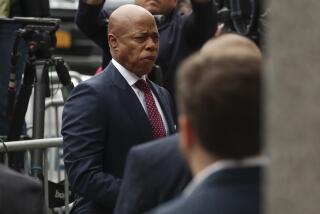Local Advocate of Reform Program : VisionQuest Probe Gets Judge’s Financial Forms
- Share via
The FBI, investigating operations of the controversial VisionQuest juvenile reform program, requested and received copies Thursday of financial disclosure statements filed by Superior Court Judge G. Dennis Adams, one of VisionQuest’s most ardent local advocates.
Federal officials declined to discuss why they wanted to examine the statements, which Adams abruptly amended this week to show that he received $3,215 in airplane tickets, motel accommodations, meals and speaking fees from VisionQuest in 1982 and 1983.
Adams, who declined to be interviewed Thursday, amended the state-mandated disclosure forms after he was interviewed by FBI agents about his association with VisionQuest, according to his attorney, Kevin Midlam.
Adams’ original disclosure statements made no mention of any fees or accommodations he received from the privately run, Tuscon, Ariz.-based VisionQuest.
“The agents spoke to the judge within the last 10 days . . . asking about his involvement with VisionQuest,” Midlam said. “I can tell you that he has no financial interest and has never had a financial interest in VisionQuest. He was never a director; he owns no stock. The trips he took were not taken on county time. There was absolutely no impropriety.”
Nor do VisionQuest officials believe that Adams was compromised.
“We’re in the business of dealing with troubled kids, and we’ve got a responsibility to educate the officials who are placing the kids with us,” said Executive Director Steve Rodgers. “It’s done every day in every business in this country.”
Rodgers estimated that more than 100 judges, legislators and other officials from across the country have received similar trips and fees from VisionQuest.
Adams’ outspoken support of VisionQuest helped influence San Diego County officials in 1981 to first send hard-core juvenile offenders to VisionQuest, instead of committing them to California Youth Authority facilities. Since then, hundreds of area youths have been sent to VisionQuest’s camps in the Southwest and on much-publicized cross-country wagon trains.
VisionQuest emphasizes rigorous outdoor activity and offers what some regard as harsh discipline to motivate wayward youths. The company is paid $27,375 per year for each teen-age delinquent San Diego County commits to the program--approximately 25% more than it costs to keep an offender in a county-run institution.
Despite the additional cost, Adams has repeatedly endorsed VisionQuest, saying publicly that he believes it is the most effective way of reducing criminal recidivism.
VisionQuest has been under investigation by both federal and county grand juries in San Diego since last year. The grand juries’ investigations were prompted by reports of child abuse at a VisionQuest camp in New Mexico, where a 16-year-old San Diego youth, Mario Cano, collapsed and died in April, 1984, after his pleas for medical attention were dismissed by camp counselors.
On the night Cano died, Adams was meeting with VisionQuest officials at a VisionQuest camp in Elfrida, Ariz., according to the company’s chief executive officer, R. Ledger (Bob) Burton. Adams’ trip to Elfrida was paid for by federal Public Health Service grant money given to VisionQuest, Burton told The Times in an interview in December.
Burton also said that Adams’ former law partner, Bob Wilson, works for VisionQuest as a paid lobbyist in Sacramento.
Adams graduated from the University of San Diego Law School in 1965, after which he worked for Federal Defenders and in private practice. His initial appointment to the bench came in 1976, when he was named a Municipal Court judge in El Cajon.
He was named to the Superior Court bench in February, 1979. Little more than a year later, he was elevated to supervising judge of the San Diego Juvenile Court and quickly became outspoken in his support of VisionQuest.
For example, as a guest of the San Diego County Juvenile Justice Commission in August, 1981, Adams publicly described VisionQuest in superlative terms, calling it a youth offender’s “last hope” before being sent to prison.
The Board of Supervisors that month approved the placing of San Diego County juveniles in VisionQuest, and 45 offenders were sent to the program.
In January, 1982, Adams was reassigned to the Superior Court, but apparently maintained an earnest interest in VisionQuest.
According to his amended disclosure statements and his attorney, Adams took VisionQuest-related trips to Hawaii, Colorado, Montana, Wyoming and Missouri during 1982 and 1983. In that time, he also took at least four trips to Arizona, including one in which he and his wife stayed in Tucson at the $65-a-night Westward Look Resort. Midlam said he doubted that Adams took any trips in 1981 using VisionQuest funds, and said he believed that Adams took only one such trip in 1984. Midlam said Adams plans to list that trip when he files his 1984 financial disclosure statement, which is due by next Friday.
It was not immediately clear whether Adams’ acceptance of travel arrangements and fees from VisionQuest constitutes a violation of any judicial guidelines.
The California Judges Assn., of which Adams and more than 1,200 other judges are voluntary members, allows compensation and reimbursement of expenses “if the source of such payments does not give appearance of influencing the judge in his judicial duties or otherwise give the appearance of impropriety.”
The association stipulates that expenses should be limited “to actual cost of travel, food and lodging reasonably incurred by the judge and, where appropriate to the occasion, by a spouse.”
More to Read
Sign up for Essential California
The most important California stories and recommendations in your inbox every morning.
You may occasionally receive promotional content from the Los Angeles Times.













